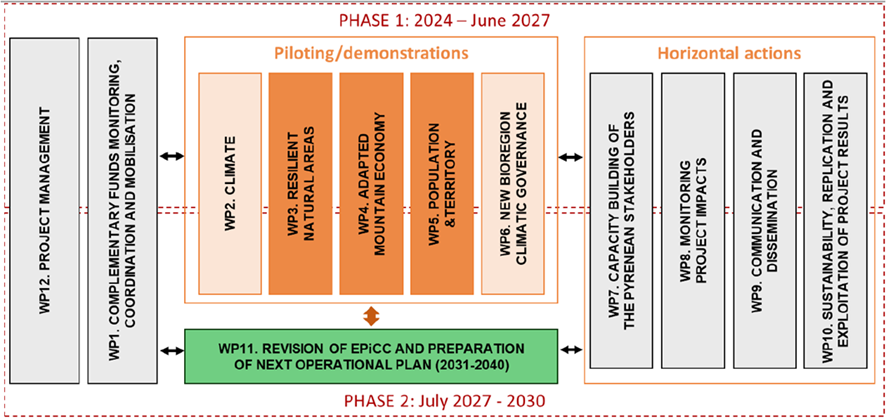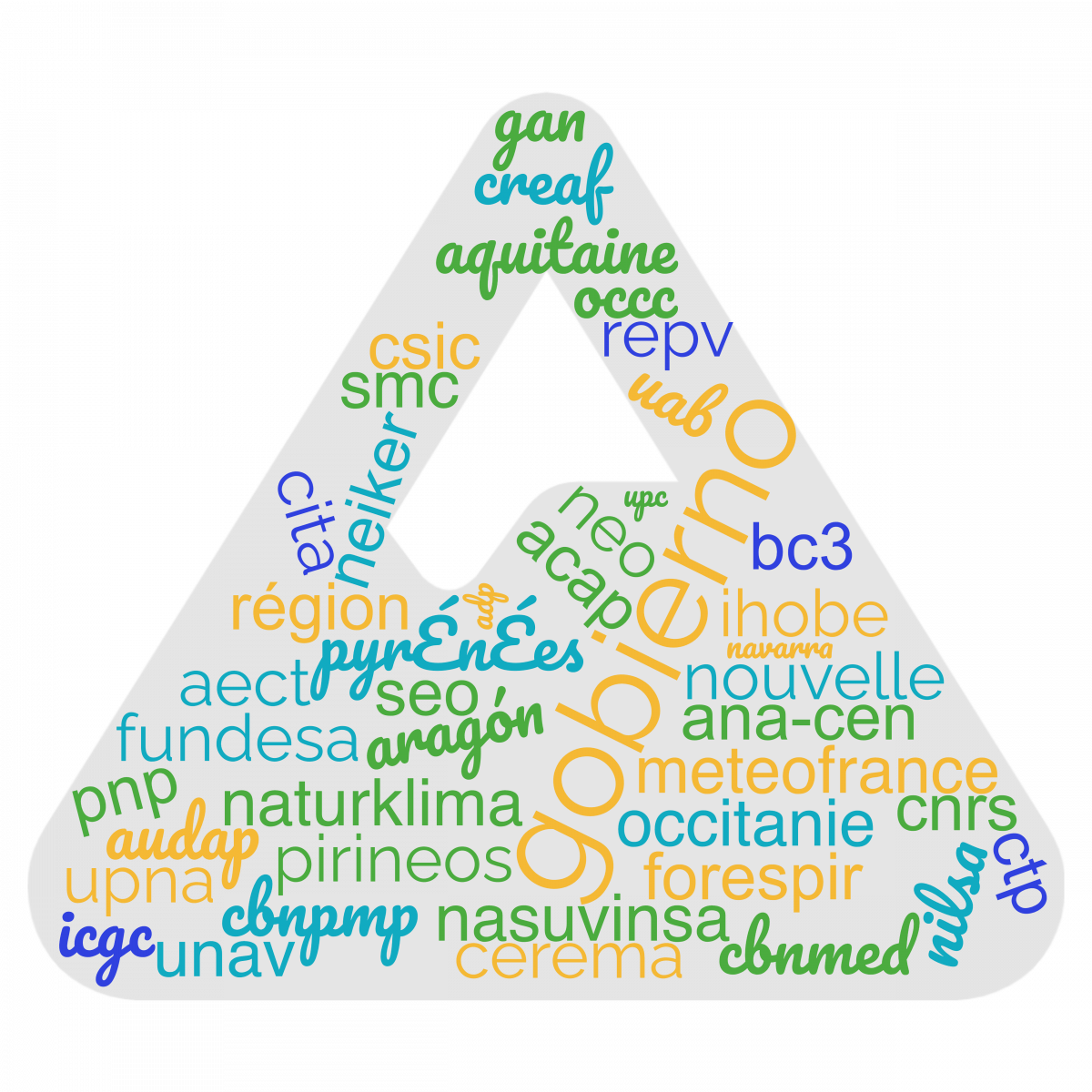Objectives
The main objective of the EPiCC strategy is to support integrative adaptation and mitigation measures which will
create positive synergies to radically improve the resilience of the Spanish-French-Andorran Pyrenees region to climate change.
Pyrenees to Climate Change, and the LIFE-SIP PYRENEES4CLIMA project supports its full implementation.
implementation. The strategy follows the principles of:
- CROSS-BORDER COOPERATION. Promote interaction between Pyrenean regions by identifying common priority adaptation measures and harmonising them with regional and national efforts.
- KNOWLEDGE GENERATION AND TRANSFER. Promote interdisciplinary and inter-territorial knowledge, the identification of experiences and good practices, their valorisation and transfer to all territories and sectors in the Pyrenees.
- INNOVATIVE ACTION. To explore, promote and get involved in innovative approaches, both in terms of technology, management and governance, which encourage the connection between science, policy, practice and society;
- SYNERGISTIC ACTION WITH THE CTP PYRENEAN STRATEGY. Promote synergies with sectors and with mitigation actions and the integration of climate change in the actions of other areas and sectors of the Pyrenean Strategy 2018-2024;
- EUROPEAN AND INTERNATIONAL VISIBILITY. Contribute to the European and international visibility of the specific climatic features of mountain areas and the cross-border nature of the Pyrenees.
Specific Objective 1
Improving the resilience of the Pyrenees to climate change as a substantial element to also improve resilience in territories connected to or dependent on ecosystem services.
Specific Objective 2
Catalyse actions to demonstrate resilience to climate change in mountain areas in the 5 identified systems.
Specific Objective 3
Strengthen the implementation of European policies, Spanish, French and Andorran state climate policies and regional climate strategies in the Pyrenees through territorial cooperation.
Work packages and operational objectives

The LIFE-SIP PYRENEES4CLIMA project is organised in 12 work packages.
Firstly, the project includes 5 work packages fully aligned with the 5 systems identified in the EPiCC that will cover the implementation of piloting and demonstration actions associated with Climate (WP2), Resilient Natural Areas (WP3), Adapted Mountain Economy (WP4), Population and Territory (WP5) and Governance (WP6).
Resilient Natural Areas (WP3), Adapted Mountain Economy (WP4), Population and Territory (WP5) and Governance (WP6). There is also a group of 3 horizontal work packages that will support and facilitate the achievement of all expected impacts, through
all expected impacts, through: capacity building of public and private stakeholders (WP7), monitoring of project impacts (WP8), communication and information management (WP9) (WP8), Communication and transfer of results (WP9) and Transparency and replicability (WP10).
From a more operational point of view, and for the achievement of each of the strategic objectives, the project will see the achievement of a number of operational objectives linked to the key work packages:
Generate detailed knowledge of the current state of climate change in the Pyrenees by analysing long-term climate trends for the Pyrenees.
Provide climate simulation datasets covering all climate variables for most of the sectors covered by the EPiCC strategy and improve the level of knowledge on climate futures in the Pyrenees, with high-resolution information and analysis of the various sources of uncertainty from climate scenarios and climate models.
To provide a set of multi-sectoral climate indices for the whole of the Pyrenees that can be used to assess climate change processes and impacts and to improve knowledge on climate futures in the Pyrenees and to improve the decisions of different stakeholders and end-users related to climate change adaptation in socio-economically vulnerable sectors (such as tourism, energy, transport, infrastructure, agropastoralism and health).
Initiate essential work to develop a climate service with real-time monitoring of the spatial extent and severity of different climate hazards, including heat waves, cold waves, extreme precipitation and droughts across the Pyrenees at high spatial resolution.
Promote better management of water resources in the Pyrenees by developing innovative information tools to better understand and continuously monitor the key elements of the Pyrenean hydrological cycle, and by implementing specific case studies focusing on actions in specific sectors.
To provide citizens, public administrations and managers with the necessary qualitative indicators of the impacts of climate change on ecosystems and sentinel species. In particular, advanced and reliable indicators based on previous experience and novel sensors, observations and protocols that can serve as a basis for the long-term datasets needed to develop and implement the most appropriate mitigation and restoration policies.
Improve understanding of the effects of adaptive management on the structure and function of Pyrenean forests and grasslands and sensitive high mountain ecosystems.
To provide tools and protocols for the improvement of ecological interconnectivity in natural areas and strategic sites.
Apply tools for the early detection and cross-border control of invasive alien species sensitive to climate change.
Develop strategies and models for the adaptation and transition of ski and mountain resorts to climate change, develop circularity solutions in the Pyrenean tourism economy through the implementation of a Tourism Innovation incubator and develop specific cross-border tourism offers, connected with the soft mobility proposals (train, bicycle) developed in the Pyrenees.
Promote adaptation through the evaluation, implementation and testing of different agro-silvo-pastoral practices to face the challenges of climate change in the Pyrenean regions.
Promote and strengthen the local marketing of agricultural and pastoral products by creating virtuous consumption loops (short circuits, reduction of goods transport) and by developing new products (diversification, economic structuring of farms in a virtuous circuit).
Test, promote and deploy new models at the ‘forest-wood’ interface that integrate conscious and sensitive forest management of natural processes, taking into account the multifunctionality of the forest (reasoned timber production while maintaining the ecosystem services provided), by establishing a dialogue between stakeholders.
Improve knowledge of ecosystem services, their valuation and promote their implementation in the Pyrenees.
Apply the "One Health" concept in the Pyrenees, estimating the influence of various environmental problems accentuated by climate change on people's health and on vulnerable ecosystems. In particular, the impact of atmospheric and water pollutants on people's health.
Enhance nature-based solutions to reinforce the protective role of Pyrenean forests to respond to natural hazards with a multi-risk approach in mountain areas, and grassland systems through ecological soil restoration.
Enhance local climate action in the Pyrenees massif by promoting local sustainability with the engagement of local actors and municipal climate networks.
Promote successful citizen science initiatives in the territory as a resource that enables involvement and commitment and carry out a joint and cross-border action for the dynamisation and promotion of citizen science in the Pyrenees, seeking a demonstrative and multiplying effect.
Consolidate and strengthen a multilevel governance system, adapting it to the new needs of the EPiCC, thus ensuring vertical and horizontal coordination of EPiCC actions with local, regional and state climate policies and with the European Strategy for Adaptation to Climate Change, and promoting the integration of climate change into sectoral policies and especially at the municipal level.
Strengthen local climate action in the Pyrenees massif by promoting local sustainability with the commitment of local actors and municipal climate networks.
Ensure the proper functioning of the monitoring and evaluation tasks of the EPiCC, promote the participation of all types of actors and the general public in the Pyrenees in its development and make available the necessary objective, updated and accessible information on an ongoing basis.
To better understand the effects of CC in various sectors, and how these effects could be avoided with mitigation and adaptation policies. In short, we hope to explain what is happening with climate change in the Pyrenees, how the climate is evolving and how it impacts on the mountain range, both in natural and socio-economic systems, and finally, how we can adapt to these impacts.
Develop and ensure the evolutionary maintenance of EPiCC tools, reports and indicators in an Integrated Climate Action Resource Platform for the Pyrenees, including a new Geographic Information System Platform on Climate Change impacts in the Pyrenees.
Secondly and transversally, the Project Management and Coordination (WP12) integrates the different actions will focus on ensuring the correct management and coordination of the actions foreseen in the different core working groups. It will include all the coordination mechanisms with the existing LIFE IP projects in the area: NADAPTA (LIFE-IP 2016), URBAN KLIMA 2050 (LIFE-IP 2018) and ARTISAN (LIFE-IP 2018). Coordination and search for complementary funds and projects will also be carried out (WP1), as well as specific activities of replication and transfer of results inside and outside the Pyrenees, to enhance the practice and scaling up of climate change adaptation measures in mountain areas (WP10).
The main objective of WP12 is to ensure the achievement of the project results through technical and administrative coordination, as well as to ensure smooth, timely and efficient organisational and financial coordination. technical and administrative coordination, as well as to ensure the fulfilment of contractual commitments with CINEA. This action will therefore address:
Communication and reporting flow to the CINEA (cost statements, audits and periodic reports).
Monitoring and planning of project progress.
Decision-making procedures.
Networking and interaction with third parties (stakeholders, policy makers, institutions...).
Preparation of regular meetings
Activate a list of potential complementary funds and update the list of complementary funds obtained annually to keep the information on potential funding opportunities up to date and to show the receipt of funds in order to obtain a better dissemination of the project.
Develop a methodology for the project consortium to be updated on potential complementary funds in order to continue to develop new complementary actions to add value to the project and improve climate change adaptation in the Pyrenees.
Establish annual meetings to review the matching opportunities and complementary funds detected and obtained in order to continue improving the activities that make the Pyrenees better adapted to Climate Change.
Disseminate the innovative technical adaptation solutions tested in the framework of the LIFE PYRENEES4CLIMA project to other mountain areas in the European Union, in order to promote and foster innovative adaptation options.
Promote the integration of the most successful strategies and solutions tested in the PYRENEES4CLIMA project in other European mountain regions to improve climate resilience.
Identify potential stakeholders willing to replicate the tested adaptation solutions and transfer the project results in order to foster an innovative adaptation pathway to improve the resilience of European mountains at all governance levels.
Develop a specific transferability and replicability plan to standardise the application of PYRENEES4CLIMATE in other European mountain areas.
Ensure the transferability and replicability of the results of the LIFE PYRENEES4CLIMATE project through a set of different and specific sub-tasks, mainly related to the collection of lessons learned or innovative good practices for adaptation, to other mountain areas.
Promote the inclusion of the most successful proven results of the project in future international policies and agreements through the signature of agreements with existing networks and bodies and cooperate with the project's policy partners from the Pyrenean region and other stakeholders from outside the area.
Expected results
Expansion of the temporal coverage of air temperature and precipitation data, before 1959 for the whole region.
Increase in the number of climate variables monitored across the region: from 3 variables at the beginning of the project to 7.
Creation of a sub-daily (hourly) rainfall database for the whole region: this database is currently not available.
Quantification and geographical extent of the Elevation Depending Warming phenomenon in the Pyrenees: this information is currently unknown.
New climate change projections for the Pyrenees as a whole based on the new models (from the Coupled Model Intercomparison Project CMIP5 (phase 5) to CMIP6 (phase 6)) and with higher spatial resolution (from 5 km to 1 km).
Provision of an open source real-time platform for the monitoring of extreme events (i.e. heat waves, cold waves, extreme precipitation and droughts) in the Pyrenees. This platform is currently not available and will include: (i) the central computer system to process the data and generate the products automatically, (ii) the database of climatic variables needed to generate the climatic hazard indices and (iii) a web-based visualisation and query tool with different functionalities to access the data.
An operational hydrological modelling tool for the Pyrenees that will allow a periodic evaluation of the hydrological cycle throughout the massif. It will also include an operational hydrological model of the Pyrenees with seasonal forecasting capability.
A new set of quantitative CC impact indicators for vulnerable ecosystems, habitats (cryosphere, hydrosphere, biosphere) and indicative species (forest, flora, fauna, invasive alien species) as well as agricultural soils and a web-based data repository located in the OPCC geoportal with tools to analyse and visualise the new time series.
Long-term trends of more than 200 plant species and plant communities of interest and vulnerable to climate change, with an estimation of decline risks and extinction rates and identification of the most vulnerable and resilient environments to climate change, and the role of the Natura 2000 network.
A time series of data (at least 10 years in duration) on ecosystem structure and function (species composition, physical and chemical composition of soil, productive performance of species such as biomass production). New calibration datasets for at least 6 different forest types (2 in Navarra, 4 in Catalonia). Generate a set of technical best practices around the use of fire (prescribed burning) and herbivory (herbivory, targeted grazing) for environmental (landscape diversity, conservation of EU priority habitats) and protection (reducing large fuel continuities in critical areas, such as mountain ridges, for forest fires) purposes.
New datasets on soil organic C sequestration in fields under organic farming and climate-smart forestry, as well as maps with geographical references to soil C content and potential C sequestration capacity, soil temperature and soil moisture under different land uses and soil management, soil type and climate.
A list of flora species and habitats vulnerable to CC, a list of invasive alien species (fauna and flora) and information from stakeholders on species and habitat conservation.
A diagnosis of current ecological continuities and vulnerable habitats.
Ecological restoration of ski resorts with 3 pilot cases in France and Spain, implementing a control plan at Pyrenean scale with eradication sites and their monitoring for an invasive alien plant.
Sustainable tourism : Adaptive roadmaps established according to the main typologies and profiles of ski resorts in the Pyrenees and their different vulnerabilities (climate, snow conditions, economic model and their impacts on the environment), A functional Tourism Innovation Incubator (sustainable energy solutions, food waste management plan in catering, local scheme of accessible eco-tourism circuits, and specific training content in the field of "circular tourism", Guidance and promotion of cross-border tourism offers in relation to the deployment of a soft mobility offer. The aim will be to ensure that the approach is long-term and sustainable (beyond the PYRENEES4CLIMA project).
Four pilot cases in 17 sites using agro-silvo-pastoral practices in the Pyrenees adapted to climate change. A guide with good practices and strategic and operational recommendations compiling the main results and conclusions of the pilot cases. A roadmap to improve the marketing of agricultural and pastoral products in the Pyrenees.
An operational network of 6 pilot territories spread over 4 regions where adaptive forest management approaches close to natural processes are the driving force for a transition towards an innovative circular bioeconomy in the forest-wood sector and which integrate local populations and elected representatives.
Six (6) co-constructed multi-sectoral methodologies for climate change adaptation to address existing challenges generated by extreme weather events and conditions that affect people's health, threaten water availability and increase the incidence of risks in high mountain areas due to increased climate variability.
Eight (8) pilot cases distributed along the Pyrenees, both on the northern and southern slopes (France and Spain), representative of the current challenges in terms of extreme events and the needs of the populations and territory to be better prepared and equipped to face climate change. They will also be defined, tested and taken into account in resilience strategies to cope with extreme climate events and conditions.
Create and strengthen a collaborative work dynamic composed of eleven (11) entities with expertise in climate change, from a multi-sectoral and multi-level understanding of the Pyrenean territory.
Promoting local climate action in disadvantaged mountain municipalities. Adaptation of the tools for the generation of local climate action plans to mountain municipalities with the development of a methodological guide and its presentation in the territory (7 dissemination workshops), the promotion of local sustainability network meetings (3); the presentation of 40 new Best Practices in local climate action and 5 workshops for the transfer of knowledge between regions and the promotion of commitment at local level. And promotion of the Covenant of Mayors for Climate and Energy in the Pyrenees.
Revitalisation of the committee of territorial climate change representatives of the OPCC (currently the Technical Committee of the Pyrenean Climate Change Observatory) and promotion of the integration of the cross-border and mountain approach in regional climate policies, as well as the horizontal coordination of EPiCC actions with ongoing territorial climate policies. The 6 regional governments of the Pyrenees are partners in the LIFE SIP project and have committed themselves to actively participate in this task.
The management and promotion of meetings with national and European representatives on climate change in mountain areas. In particular, the organisation of a biennial meeting to share progress and new developments in climate policies in Europe (European Mountain Forum). The consolidation and dynamisation of a multi-level system of governance of the EPiCC in line with new needs, such as the expansion of the Advisory Committee in its advisory and guidance tasks.
The implementation and dynamisation of the governance set up in the EPiCC Monitoring Committee (MESEPiCC), the development and animation of an online platform for cross-border citizen participation, and
the development and continuous updating of a scorecard to monitor the evolution of the strategy's indicators.
Raising the level of awareness throughout society of the particular vulnerability of the Pyrenees mountain range to the effects of CC. Increased commitment of the Territories in the development of initiatives and actions for long-term climate action. Increased territorial, European and international visibility of the Pyrenees as a virtuous bioregion in cooperation for climate action. Increased public awareness and interest in monitoring the impacts of climate change. Publication of the BCCIPYR on the annual climate change situation in the Pyrenees.
Incorporation of new and innovative resources to support adaptation in the Integrated Resource Platform for Climate Action EPiCC, as well as the continuous updating of the main indicators of climate change in the Pyrenees.
Pyrenees. Specifically: Development of cartographic layers of a new climate database on a daily basis with anomalies of temperature, precipitation, snow, wind speed for all the Pyrenees; development and regular updating of new socio-economic indicators on the impact of climate change in the Pyrenees; development of an analysis tool for customised consultations on climate change in an area of the Pyrenees (EPiCC-OPCC Geoportal); new socio-economic indicators on the impact of climate change in the Pyrenees.
Successful project management means achieving the project objectives in a timely manner, with the resources defined in the proposal, ensuring its quality.
Considering that all the activities related to technical and administrative issues are successfully carried out, the results will be:
The organisation of consortium meetings
The delivery of reports and deliverables included in the project to CINEA/European Commission.
In particular, it is foreseen the submission of an intermediate report (3 months after the execution of the 1st phase), and a final report at the end of the project containing a detailed description of all activities and results obtained.
Highlight to policy makers the importance of achieving synergies between funds and complementary actions to develop more intensive and effective plans for adaptation to climate change with a methodological handbook that can serve as a guide for future projects.
Encourage cooperation between policy makers at all levels (regional, national and European), for a better coordination
of climate actions in mountain areas or elsewhere.
Effective cooperation between policy makers for future complementary projects: the project expects to add at least 15 complementary funding activities during the duration of the LIFE PYRENEES4CLIMATE project.
Simplification of cooperation between replicators by publishing the map of potential stakeholders and replicators.
The transferability and replication plan handbook and lessons learned handbook, which is expected to facilitate policy development in transboundary mountain areas.
Catalyse networking, with specialised and counterpart stakeholders and other projects (mainly focused on transboundary mountain areas).
Project summary sheet
Score board of the project
Basic information
Call: LIFE-2022-STRAT-two-stage - Strategic Integrated Projects - Climate Action Proposal Number: 101104957
Project start date: 1 October 2023
Project (planned) end date: 31 April 2031
Total budget submitted: 19 829 877,72 €.
Requested EU funding: 11 897 926,60 €.
Funding rate: 60% grant
Project partners
The LIFE PYRENEES4CLIMA project has 40 beneficiary partners, 6 affiliated entities and 8 associated partners.
Download here the brochure to learn about the main entities, the teams behind the project, and the pilot cases map!

Région Nouvelle-Aquitaine / Departamento de medio ambiente y turismo, Gobierno de Aragón / Departament d’acció climàtica, alimentació i agenda rural / Sociedad Pública de Gestión ambiental ihobe S.A. / Région Occitanie / Comunidad foral de Navarra - Gobierno de Navarra / Servei meterològic de catalunya / Météo-France / Agencia Estatal Consejo superior de Investigaciones Científicas / Syndicat mixte Conservatoire Botanique pyreneen / Agence des Pyrénées / Centro de investigación ecológica y aplicaciones forestales / GEIE forespir /Agrupación europea de cooperación territorial
Pirineos-Pyrénées / Universitat de Barcelona / Reseau Education Pyrenees Vivantes / Navarra de suelo y vivienda S.A. / Association des chambres d’agriculture des Pyrenees / ANA-Conservatoire d’ Espaces Naturels Ariege / Agence d’Urbanisme Atlantique et Pyrénées / Asociación BC3 Basque Centre for Climate Change - klima aldaketa ikergai / Centre d’études et d’expertise sur les risques, l’environnement la mobilité et l’amenagement / Centro de Investigación y Tecnología Agroalimentaria de Aragón / Centre National de la Recherche Scientifique / Université de Pau et des Pays de l’Adour / Fundación para el Desarrollo Socioeconómico del Alto Aragón / Gestión Ambiental de Navarra S.A / Institut Cartografic i Geologic de Catalunya / Instituto Vasco de Investigación y desarrollo agrario S.A. / Nature en Occitanie / Navarra de Infraestructuras Locales S.A. / Fundación de Cambio Climático de Gipuzkoa / Fundación Observatorio del Ebro / Parc National des Pyrénées / Sociedad Española de Ornitología / Universitat Autónoma de Barcelona / Universidad de Navarra / Universitat Politecnica de Catalunya / Universidad Pública de Navarra / Conservatoire Botanique National Méditerranéen de Porquerolles.
PYRENEAN CLIMATE CHANGE OBSERVATORY
Avenida Nuestra Señora de la Victoria, 8
22.700 - Jaca
Huesca - España
+34 974 36 31 00
info_opcc@ctp.org





